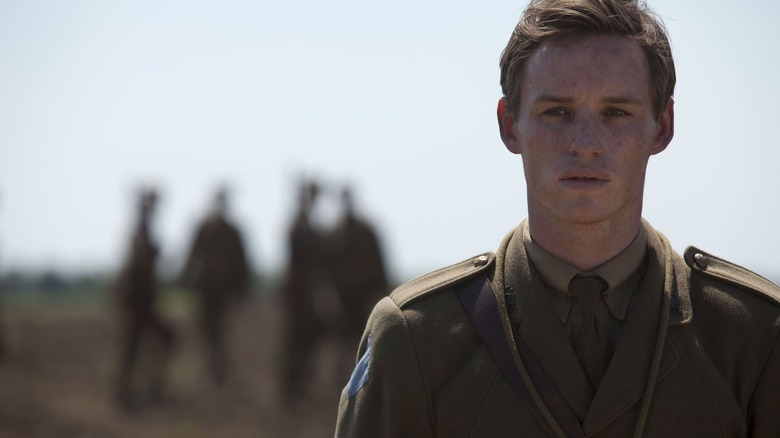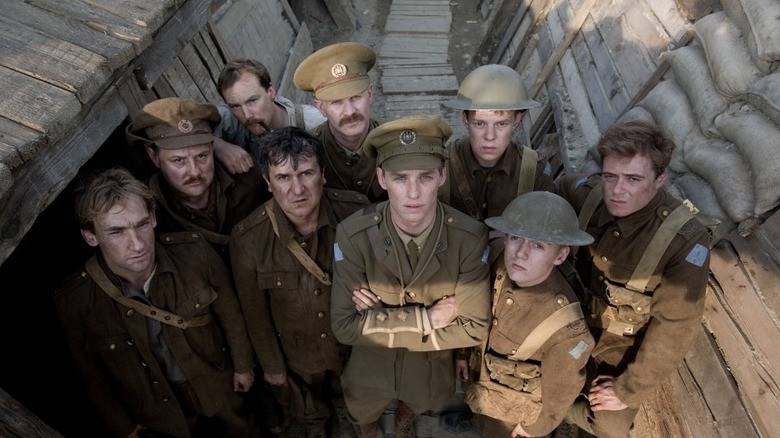Researching Birdsong Was 'Dumbfoundingly Humbling' For Eddie Redmayne
When Eddie Redmayne takes on a role, he's been known to go on a research deep dive to get into the proper headspace needed to fully embody the characters he portrays. Sometimes, this research has a significant impact on Redmayne that challenges and — ultimately — shapes his worldview.
Redmayne recently broke down his career in a new video for Vanity Fair, revealing just how long research has been integral to his creative process. During the video, he spoke about his experience prepping for the two-part serial "Birdsong," and how humbling of an experience it was in learning more about the miners of World War I.
"Birdsong" is an adaptation of the novel by Sebastian Faulks, though there are significant differences between the original novel and the serial. The serial takes place between the years 1910 and 1919 and follows the journey of Redmayne's Stephen Wraysford. Throughout the course of the serial, we see Wraysford's experiences in the war, but more importantly, experience the horrors he witnesses whilst operating alongside the miners, where every second is a gift.
To understand more of the experience that Wraysford, Redmayne went deep into preparation as always. This prep led him to France, where he was able to personally experience being in a chalk-mine, but also experienced a sobering reminder of these soldiers' final moments.
Poetry of the dead
In the video, Redmayne shared how he had known nothing about the sappers aka the miners, who would dig tunnels under No Man's Land to plant bombs and explosives — a thankless, mostly forgotten job of the wartime period. Redmayne then explained a personal experience he had whilst preparing for the role in France:
"I was lucky enough in the prep to it to go to this newly found mine in France. And basically you went down this chalk mine that hadn't been seen or opened ... since the First World War. And I went down with this miner with a torch, and it was all chalk. ... The miner then pointed to this bit of writing in pencil that had been written by a soldier during the First World War in this kind of dug space underneath no man's land. So imagining that, all the chaos and carnage going above. And he'd written in pencil this poem that went:
'If in this place you are detained
Don't look around you all in vain
Cast your net and you shall find
That every cloud is silver-lined
Still.'
And this was written in pencil, this idea that this man might be buried there, and that no one had seen this pencil writing for ... It was an instant connection to something that was dumbfoundingly humbling."
Redmayne's startling discovery hints at an unfortunate truth of the First World War. Many young men — potential writers, poets, playwrights, etc. — had their lives taken from them, leaving behind written testaments on the horrors of the war.
To die for one's country
Much of the writing we think about for the First World War came via "The Lost Generation," the mostly American writers who experienced the war and used their art to reconcile with their trauma. Most famous of the bunch is arguably Ernest Hemingway. But the poetry written during the war was unflinching in its portrayal of its horror. One of the most brutal of these is "Dulce et Decorum Est" by Wilfred Owen, which details what a gas attack was like for the soldiers. Owen tears apart what it means to die for one's own country. Whether waiting for the final remnants of oxygen to fade out whilst trapped in a mine, watching your friends and compatriots explode, or feeling your skin and eyes burns from the effects of mustard gas, all of these experiences were recorded in written texts via diaries, poetry scraps, and more.
As Redmayne discovered, the best way to get into the headspace of a person is immersion. In his case, visiting a mine and coming across a dead miner's poem put things into perspective for him. Life is easily snuffed out. Potential lost. While we move about our daily lives today, we must never forget what was sacrificed before and what could have been.


